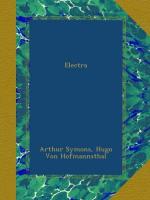|
This section contains 3,429 words (approx. 9 pages at 400 words per page) |

|
The Sophoclean Electra departs in significant ways from the versions of Aeschylus and Euripides, and as we shall see, it is precisely these departures that Hofmannsthal engages in his version. Although different in all other respects, Aeschylus and Euripides each place the matricide at the dramaturgical and moral center of the play. In both plays, Orestes pretends to be the messenger of his own death and gains entrance into the palace with this disguise. In both plays, the recognition between brother and sister occurs before Orestes carries out his plan. Recognition and disguise are subsidiary features in a plot that moves toward the realization of the horror of matricide as its central event.
At first sight, the Sophoclean play shows an almost perverse lack of interest in the problematical nature of matricide, as the playwright pursues the question: what would happen if Electra heard the false news...
|
This section contains 3,429 words (approx. 9 pages at 400 words per page) |

|




